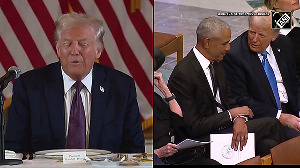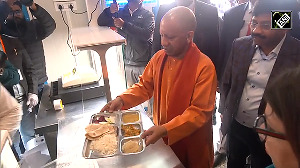The IT manufacturing community in India appears to be still confused on the implications of the duty free regime which will come into effect in 2005.
This became clear during the discussions on Monday in Bangalore as part of the seminar on the 'Implications of the Duty Free Regime' held by Manufacturers Association for Information Technology.
Ideas and concepts were thrown across the hall as people debated everything from whether manufacturing truly happened in India or whether mere assembly went disguised as manufacturing.
Whether the ODM route was the right way to go to increase manufacturing in the country or to whether the duty-free regime would change anything were the other points debated.
"With the duty free regime, the price of imported IT goods will fall. With that will follow a rise in demand and unlike the demand so far, this WTO imposed demand will be sustainable. This means more MNCs will be encouraged to set up manufacturing shop in the country. And once they do, components and assemblers will follow suit," said M V Appa Rao, MD, Solectron Centum.
While some averred with him, there were others who said that the 2005 duty free regime was more of a progressive occurrence in which duty has been regularly cut over the last two years.
They believe that the present 10 per cent cut in the excise duty, as it exists on PCs, will do nothing to boost demand and therefore change nothing in the larger scenario.
While there was no consensus on whether a local market was necessary or not for increasing MNC manufacturing activities in the country or whether increased IT penetration will widen the market, what was missing was any serious talk on local manufacturers and what could happen to them following the lifting of customs duty on 217 pieces of IT hardware.
Sanjay Handu of Tyco were one of the few who touched upon it when he said, "One of the things missed out here is the fact that India does not need to compete with other countries whose manufacturing base is already big. We can look for a lateral move where we use our engineering skill sets but still keep the volumes low.
"Moreover, if we do decide to compete directly it is important to realise that manufacturing is more than the big players. There has to be a mass movement and that is the only way to get scale. The big players have to work to change the smaller ones mindsets and get them more aggressive. We have to develop strategies that will work in our environment."
Speaking on the same keel, Ram Agarwal, CEO of Wep Peripherals said, "Our industry should create clusters -- clusters in terms of products and places. IT is too fragmented now. We have to improve labour efficiency to such a degree that government inefficiency does not affect us."
Agreeing with him, Vinay Deshpande, VP of MAIT added, "As a country we have to grow selective elements in strength. Something like what Singapore has done for hard disk manufacture."
One of the few points that almost everybody agreed on was the sales tax levied on the sale of finished IT goods within India. The same goods, if imported, do not attract tax, while manufacturers who import components and pay duty on the same, have to pay a certain sales tax on selling the finished product in the Indian market.
While many agreed that the implementation of VAT next year will be helpful, they expressed doubt if it would be implemented at all.
Another point of agreement among the industry representatives present was that the design strength of India should be better utilised and integrated into the manufacturing sector to help drive and improve it as a segment.
Speaking during the session, Vinnie Mehta, executive director, MAIT said, "The Indian manufacturing industry is not going down due to the duty free regime. We have survived so far and I believe that the industry will stand up and survive this one too. The government's attitude is very sensible and I have hope that all the anomalies in the area of tax will be set right soon."
His optimism though, does not seem to be shared by many an industry player and can work to the disadvantage of an industry that does not have a conclusive plan on how to tackle the duty free regime.





 © 2025
© 2025